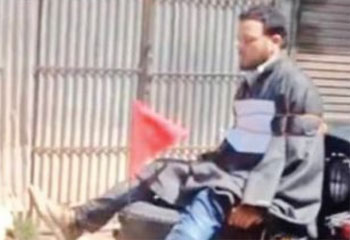Amjed Jaaved
Each year, on 10th December, the United Nations observes international human rights day. The United Nations General Assembly adopted, When General Assembly adopted the Universal Declara-tion of Human Rights in 1948, it was proclaimed as a “common standard of achievement for all peoples and all nations”.
The Universal Declaration of Human Rights sets out a broad range of fundamental rights and free-doms to which all of us are entitled. It guarantees the rights of every individual everywhere, without distinction based on nationality, place of residence, gender, national or ethnic origin, religion, language, or any other status.
Kashmir, a prison
The day comes and goes by without any tangible effect on the lives of the people deprived of human rights. Aside from the legal rigmarole about the Kashmir dispute, there is a human rights dimension to the dispute. Kashmir has been reduced to a prison. Even Mehbooba Mufti, a former BJP ally, was compelled to call Kashmir a Guantanamo Bay prison, claiming that “Kashmiris feel that they are literally imprisoned in a cage from which almost all exit routes are barred”.
Even though international human rights law for-bids a country to violate human rights conventions even in sovereign territories, India’s stance that nothing of the sort is happening in occupied Kash-mir remains firm.
No action on the Pakistan dossier enumerat-ing rights violations
Pakistan shared with 100 countries of the world a 131-page and the world at large a dossier reflect-ing India’s reign of terror in Kashmir. It is hearten-ing that the UN human rights chief Michelle Bach-elet appealed to India for safeguarding human rights defenders and NGOs, saying three laws stifle their work, among them one that discriminates against religious minorities including Muslims, who are the country’s second-largest religious group.
India’s dismal human-rights profile
According to the United Nations High Commis-sioner for Refugees (UNHCR), more than 1,250 Kashmiris have been blinded by metal pellets used by Indian security forces from mid-2016 to the end of 2018.
Indian troops in their unabated acts of state terrorism martyred 95,917 innocent Kashmiris including 7,215 in custody, widowed 22,939, orphaned 107, and 855 and molested 11,245 women since January 1989. India has introduced coercive measures including new domicile laws to change the demographic structure of occupied Kashmir. These actions violate the UNSC resolutions and interna-tional law, including the Fourth Geneva Convention and Security Council Resolution 122. Kashmir gagged
The clampdown on internet communication in occupied Kashmir was made even more on August 5. Amnesty International has urged unconditional and unconstrained access to news and information from the valley.
India’s crackdown on Human Rights Day
India’s crackdowns and cordon-and-search opera-tions continued in occupied Kashmir even the Hu-man Rights Day. They did not spare even peaceful protesters like the 62-year-old Parveena Ahanger and the families of hundreds of victims of enforced disappearances. They had reportedly gathered at a park to seek the whereabouts of their children or spouses who disappeared during decades of conflict.
The plight of rights activists and journalists
Last month, prominent rights activist Khurram Parvez was arrested under the Unlawful Activities Prevention Act (UAPA) for “criminal conspiracy and waging war against the government”. Parvez, 44, is programme coordinator at Jammu-Kashmir Coalition of Civil Society (JKCCS), a leading group documenting and campaigning against rights abuses by the Indian forces in occupied Kashmir for the last 20 years.
The JKCCS has published extensive reports on torture, civilian killings, rapes and illegal detentions, and detailed the impunity given to by the armed forces in the disputed region. In 2008, a shocking disclosure about the presence of more than 2,000 unmarked graves shocked the people.
Parvez had earlier been arrested in 2016 under the Public Safety Act (PSA). This is another draco-nian law like the UAPA under which a person can be detained for a year or more without trial.
In its 2018 report, the United Nations High Commissioner for Human Rights (OHCHR) exten-sively quoted JKCCS findings. In another report in 2019, the UN called for the formation of a commis-sion of inquiry into the allegations of rights viola-tions in the region.
The reports irked the Modi government so much that it cracked down on journalists and ordinary people on Rights Day. India has, practically, “criminalised human rights work” in occupied Kashmir.
India ranks among the most dangerous countries for journalists, according to Reporters Without Bor-ders, which published its 2021 World Press Free-dom Index. The coordinated hate campaign against journalists calls for the journalists concerned to be murdered. From May 2019 to August 2021, 256 journalists were attacked.
—Courtesy Kashmir Watch










